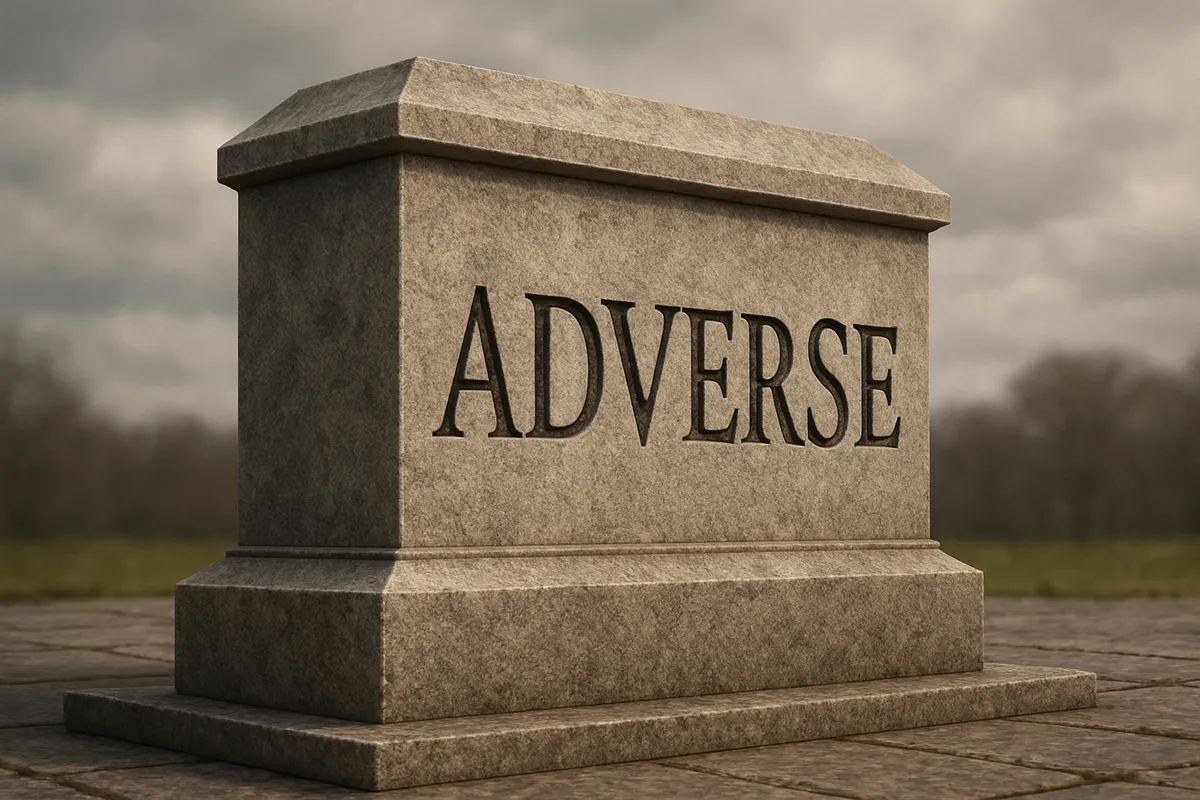'Adverse': The Hidden Judgment Inside One Clinical Word
 When Clinical Terms are Written in Stone, They Turn Autism into Damage
When Clinical Terms are Written in Stone, They Turn Autism into Damage
In a recent Mass General Brigham research study published in Obstetrics & Gynecology journal about COVID-19 and its effects during pregnancy, the authors characterized autism and developmental differences as potential “adverse neurodevelopmental outcomes.” Webster's Dictionary defines "adverse" as harmful. That single word performs centuries of quiet work. It folds human variation into the language of pathology. It trains both scientists and readers to see divergence as injury.
“Adverse neurodevelopmental outcome.” It sounds responsible. Clinical. Objective. But inside that phrase, a value judgment hides in plain sight. “Adverse” doesn’t describe what is; it declares what shouldn’t be.
When researchers write that a diagnosis like autism is an “adverse outcome,” they’re not just counting data. They’re telling the world which kinds of brains count as harm. The science looks objective; the morality is embedded in the adjective. My issue isn’t with individual clinicians but with a linguistic inheritance that medicine rarely pauses to question. I invite any scientist reading this critique to reflect on that.
The Assumptions Inside Adverse
Typical equals good. The word assumes there is one correct developmental trajectory — and that deviation equals decline. It turns statistical averages into moral norms.
Difference equals risk. “Adverse” presumes that any departure from the neurotypical path is a hazard to be monitored or prevented. It transforms curiosity into caution.
Monitoring is moral. Once difference is defined as risk, surveillance becomes a form of care. Early detection, long-term monitoring, and predictive screening all sound compassionate when the framework has already labeled certain outcomes as harmful.
Mothers are vectors. In perinatal studies, adverse outcomes often trace back to the maternal body. What was once a viral exposure becomes a moral one: You failed to protect the fetus. The adjective silently allocates blame.
The facade of objectivity exempts responsibility. Because it sounds scientific, “adverse” allows researchers to believe they’re merely describing results. But the word performs an ethical act — it divides human variation into desirable and undesirable categories. Pretending that division is neutral is itself a moral choice.
Autism as tragedy, not trajectory. Underneath it all sits a single storyline: autism interrupts normal development rather than constituting a valid form of it. The grammar of “adverse outcome” makes disability an event that happens to humanity, not a dimension of it.
The Public Skim
Most people never read the data table. They read the title, the abstract, and the pull quote. That’s where the harm takes root.
A parent scrolling headlines sees:
“COVID-19 During Pregnancy Linked to Higher Risk of Adverse Neurodevelopmental Outcomes.”
They don’t need to read further. The implication lands instantly: autism equals damage. Fear sets in long before context can catch up.
Clinicians and journalists skim it too. The framing primes professionals to flag “risk,” to schedule monitoring, and to extract the most clickable phrase — COVID-exposed babies more likely to have autism. By the time it reaches social media, nuance is gone and the adjective has done its work.
What we're dealing with is the loop of authority, how ideas circulate between research, media and the public — a cycle where each actor reinforces the framing of the last one:
- A study embeds moral language in scientific prose.
- A press office translates it into risk framing.
- Media repeat it for reach.
- Parents panic.
- Funders respond to the fear.
- Researchers cite the coverage as proof of relevance.
Everyone feels responsible; the system itself is what causes harm.
The Sentence That Seals It
“These findings highlight the importance of long-term neurodevelopmental monitoring for SARS-CoV-2–exposed children.”
It reads like care. But the phrase long-term monitoring enacts surveillance logic, not support logic. It presumes pathology waiting to emerge. It casts children as potential failures in need of lifelong observation.
If the authors had said, “These findings underscore the importance of ensuring access to developmental supports for all pandemic-born children,” the frame would have shifted entirely. One sentence could have turned fear into responsibility. Instead, it reinforced suspicion.
The Reframe: Survival, Not Injury
The deeper irony is that the study might just as easily prove the opposite of what its language implies. If COVID-19 truly endangered fetal development, then every autistic child born after maternal infection is evidence of resilience — a brain that adapted, persisted, survived.
Maybe what survived wasn’t damage. Maybe it was difference. Not hierarchy; resilience.
That’s the story a harm-aware framework would tell: human variation endures even under biological stress. Yet the system that calls itself objective can’t imagine difference without deficit. So it mistakes survival for injury.
The Work of Repair
We don’t need new euphemisms. We need new adjectives — ones that describe without condemning. Instead of adverse, say divergent, variant, or simply observed. Replace outcome with trajectory, pattern, or pathway.
Precision isn’t only about numbers. It’s about what words make possible.
Until research learns to tell the difference between description and diagnosis-as-judgment, every “adverse outcome” will keep echoing like a verdict. And autistic people will keep answering back — not to deny the science, but to reclaim the language that keeps calling our survival a mistake.
Because when “adverse” means us, the language itself needs treatment.
We don’t need new euphemisms. We need new adjectives — ones that describe without condemning. Instead of adverse, say divergent, variant, or simply observed. Replace outcome with trajectory, pattern, or pathway.
Precision isn’t only about numbers. It’s about what words make possible.
Until research learns to tell the difference between description and diagnosis-as-judgment, every “adverse outcome” will keep echoing like a verdict. And autistic people will keep answering back — not to deny the science, but to reclaim the language that keeps calling our survival a mistake.